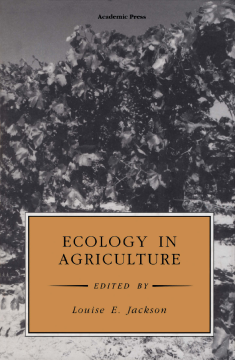
Additional Information
Book Details
Abstract
Agricultural crops are prominent features of an increasing number of variously perturbed ecosystems and the landscapes occupied by these ecosystems. Yet the ecology of agricultural-dominated landscapes is only now receiving the scientific attention it has long deserved. This attention has been stimulated by the realization that all agriculture must become sustainable year after year while leaving nearby ecosystems unaffected.
Ecology in Agriculture focuses exclusively on the ecology of agricultural ecosystems. The book is divided into four major sections. An introduction establishes the unique ties between agricultural and ecological sciences. The second section describes the community ecology of these sorts of ecosystems, while the final section focuses on the processes that operate throughout these agricultural landscapes.
- Contains an ecological perspective on agricultural production and resource utilization
- Includes in-depth reviews of major issues in crop ecology by active researchers
- Covers a range of topics in agricultural ecophysiology, community ecology, and ecosystems ecology
- Provides examples of ecological approaches to solving problems in crop management and environmental quality
"The editor and contributors have done an admirable job covering the three levels of ecological/agricultural interactions. Recommended highly for libraries maintaining agricultural, ecological, and horticultural collections." --Choice
"...a real benefit of this book will be for professionals seeking an up-to-date synopsis of current research, as the text is immensely detailed, very fully referenced and supported with appropriate data. Ecologists, agronomists and crop scientists will find this book an asset to have on their shelves for reference. Overall, a very laudable collection of papers spanning both ecology and agronomy, which should provide a useful resource for new and current practitioners." --Biological Journal of The Linnean Society
"The editor has provided a text which will stimulate discussion within the agricultural industry. Individuals who may benefit from reading this book include researchers, teachers, and students." --The Canadian Field-Naturalist, 1999
